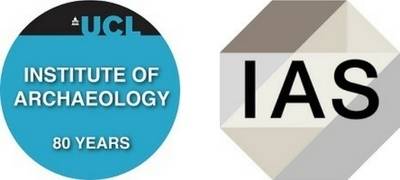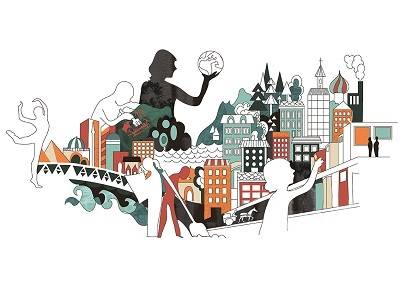The Centre is conducting joint research, initially under five main thematic areas. Alongside these areas, the Heritage Academy aims to create a bridge between the academic world and the surrounding society, in line with UCL's commitment to strengthening dialogue between research and practice.
- Curating the city
Transdisciplinary approaches in urban settings
This cluster focuses on urban heritage, exploring the dilemmas faced by academics and practitioners, specialists and laypeople, policy makers and citizens alike when it comes to negotiating the relationship between the urban past, present and future.
The curatorial approach is intended to frame a critique of the traditional role of the expert in identifying and defining heritage. It evokes a more distributed, diverse and democratic understanding of heritage practices, objects and conceptions which is developed in collaboration with different stakeholders, subject matters and audiences in the city, through creative and participatory processes. It also frames conservation and management of heritage as innovative rather than constraining practices, within the larger framework of global sustainability.
Find out more about Curating the city
- Embracing the archive
Critical archival and digital humanities studies cluster
The work of this cluster intersects with that of ICARUS (the International Centre for Archives and Records Research) and the UCL Centre for Digital Humanities, both based in the Department of Information Studies at UCL, but both operating on a cross-disciplinary basis. We also collaborate closely with colleagues in Gothenburg as part of the joint UCL / University of Gothenburg 'Embracing the Archive' cluster.
We take the Archival Multiverse and a participatory approach to knowledge production as a starting point. We are interested in collaborating with all those inside and outside the academy who are interested in critically exploring questions about the nature of the archive and digital cultural heritage.
Find out more about Embracing the archive
- Making global heritage futures
The Making Global Heritage Futures (MGHF) cluster has a critical and interdisciplinary focus on how heritage - as elaborations of artifacts, practices or ideas of the past -constitutes a part of, and is used in, ongoing political, economic, social and cultural processes traversing local, national and global scales.
Find out more about Making global heritage futures
- Heritage and wellbeing
The core agenda of this cluster is to critically explore the connectivities between heritage and wellbeing. We address from various perspectives the key question of: 'what constitutes wellbeing' and more specifically we ask; how heritage is called upon to make sense of what constitutes wellbeing and in turn how wellbeing is called upon to make sense of what constitutes heritage.
Find out more about Heritage and wellbeing- Heritage and science
Conservation science has been at the core of heritage studies since their very inception. What is meant by conservation in different cultural settings and the way science sustains a universal approach to heritage value has come under scrutiny. We intend to follow this further as well as recognise that during the last 5-10 years we have witnessed a science turn within humanities and social sciences.
Find out more about Heritage and science
- Heritage academy
Existing relations with museums and cultural institutions in London provide a strong base for exploring further positive developments between critical heritage research and partners outside UCL. We see positive outcomes in establishing stronger shared dialogues and research initiatives through creating a Heritage Academy. Our aim will be to create a London-wide network of support and dialogue to generate new research questions and educational opportunities.
Find out more about the Heritage academy
- Waste/Wasted Heritage
While a conventional spatial understanding of the relationship between waste and heritage tends to place one in opposition to the other (for example the contrast between the museum and the rubbish dump as end points in the life cycle of redundant objects), the aim of this cross-cluster theme is to explore the more complicated understandings of objects, places, practices and values that cut across these two categories and to consider how such explorations might illuminate new ways of understanding the role of heritage in the Anthropocene and lead to new, cross-cluster collaborations on issues of contemporary global concern. We envisage exploring these questions as they apply to processes across various scales and in different settings, ranging from the minute and domestic to the largescale and public.
Find out more about Waste/Wasted Heritage
 Close
Close



